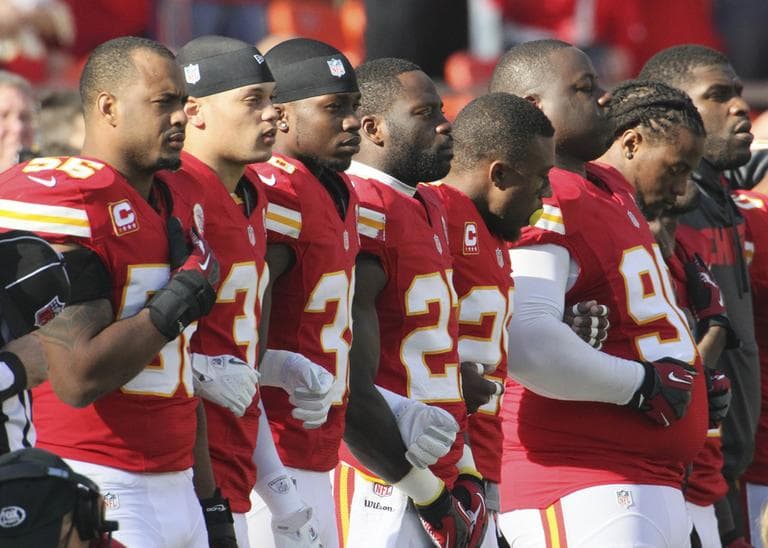Advertisement
In Depth
After Jovan Belcher Shootings, How NFL Can Support Its Players

Last Saturday, Kansas City Chiefs linebacker Jovan Belcher shot to death Kasandra Perkins, the mother of their three-month-old daughter. Then Belcher drove to the stadium where the Chiefs play and, in the presence of the team's head coach and general manager, he committed suicide.
Troy Vincent, who played in the NFL from 1992 until 2006, is the league's vice president of player engagement. He spoke with Bill Littlefield about the Belcher case and what the league is doing to help other players before tragedies happen.
In a recent interview, Vincent characterized Belcher as "a troubled individual." But Vincent says at this point, there's nothing to suggest Belcher's football career was a factor in the murder-suicide.
"There's nothing, at least to our knowledge, of the game being associated with the horrific crime," Vincent said. "When I referenced 'trouble', it was in the light of, to take someone's life and then to take your own - I'm not a licensed doctor - that tells me that there's something, that tells us, that tells most, that something's going on there. Something's going on in your mind that no one knew about, and it was never discussed."
It's a shared responsibility... In every area of your life, we should be holding each other accountable. We know we have to take care of one another.
Troy Vincent, NFL vice president of player engagement
There have been questions about whether a history of head injuries could have been a factor, but Vincent says there's no evidence that Belcher suffered from ill effects.
"He [was] 25 years old, so he hadn't been at the professional level that long," Vincent said, "but none of that has been brought to our knowledge."
Vincent has said players need to do a better job of supporting each other. In part, that means changing players' attitudes.
"It's time for us to move beyond the stigmas that are associated with mental health, the stigmas of being tough," Vincent said. "And we begin to take care of one another. We understand, because we spend so much time with each other inside the locker room, it's a shared responsibility. One, whether it's painkillers; two, whether you're having relationship conflicts; three, you're showing up to work late. In every area of your life, we should be holding each other accountable. We know we have to take care of one another."
Advertisement
Police say Belcher and Perkins received counseling from the Chiefs. The team has not specified what support it offered the couple. Vincent said even though help is being offered, it's hard to convince players to take advantage of it.
"It's a stigma that's been associated with just the male culture, not just football players," Vincent said. "And this is why we went out and established the NFL Life Line, in collaboration with the National Suicide Prevention Lifeline, where if a player doesn't want to use his employer's services, there's another place that's independent of our office, independent of your club, to seek this counselling."
Some in the media have suggested that suicides by former players including Junior Seau and Dave Duerson, combined with violent behavior by other current and retired NFL players, indicate a trend, but Vincent argued the league is merely prone to the same problems as society at large.
"We're not immune to issues of suicide, substance abuse, transitional issues, domestic violence issues," Vincent said. "We don't find it a new trend. We just have to continue to keep, again, identifying our problem, educating our workforce, continue to put in preventive measures, and then it's back to the shared responsibility. Are we concerned? There's always a level of concern, but we feel like we've done some things, collaborating with the right partners, both nationally and locally, to address and to educate not just the players, but our entire workforce."
This segment aired on December 8, 2012.